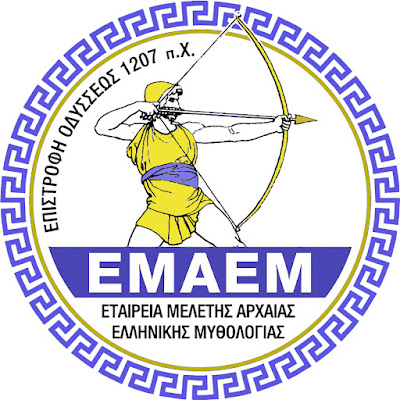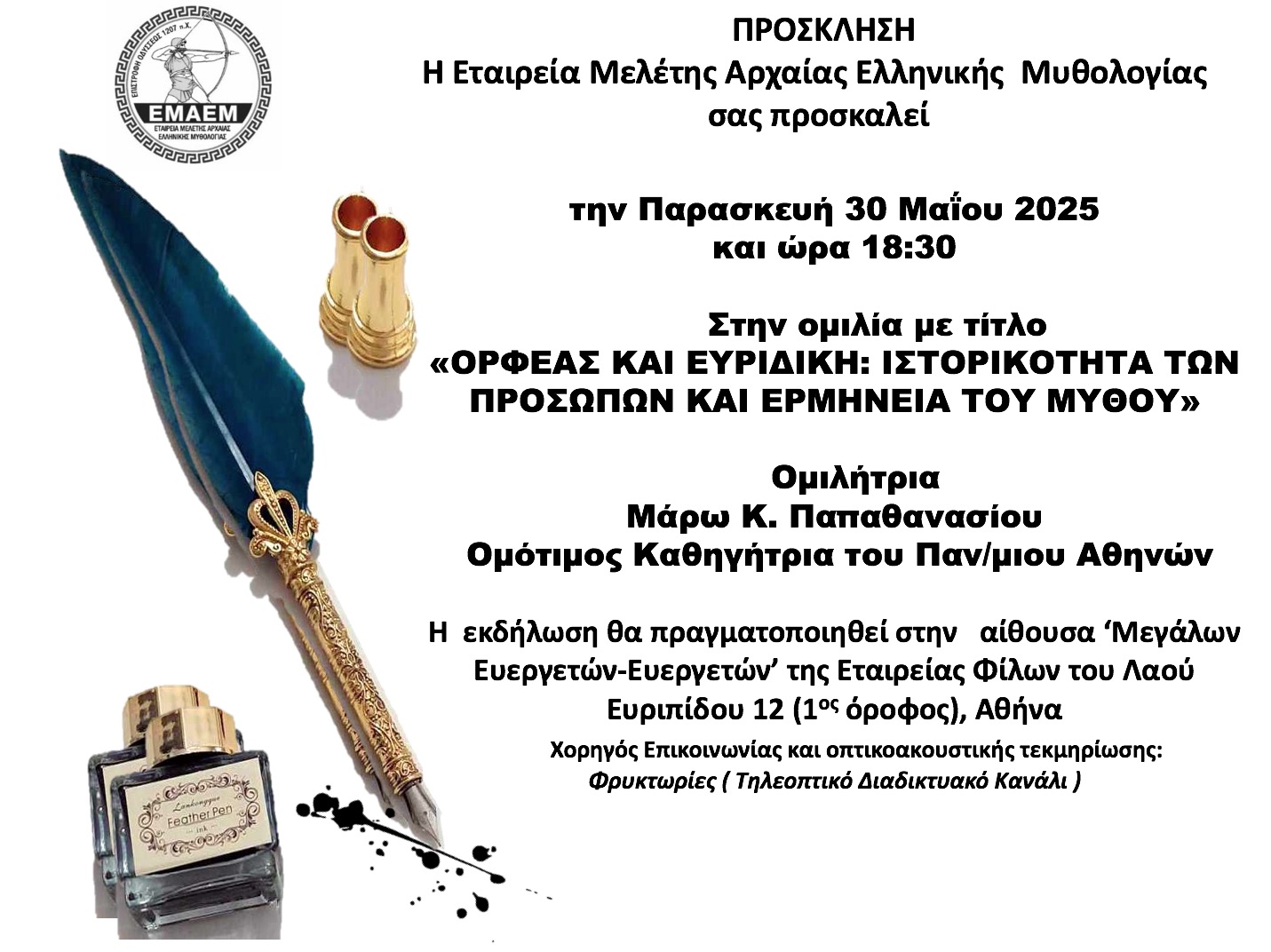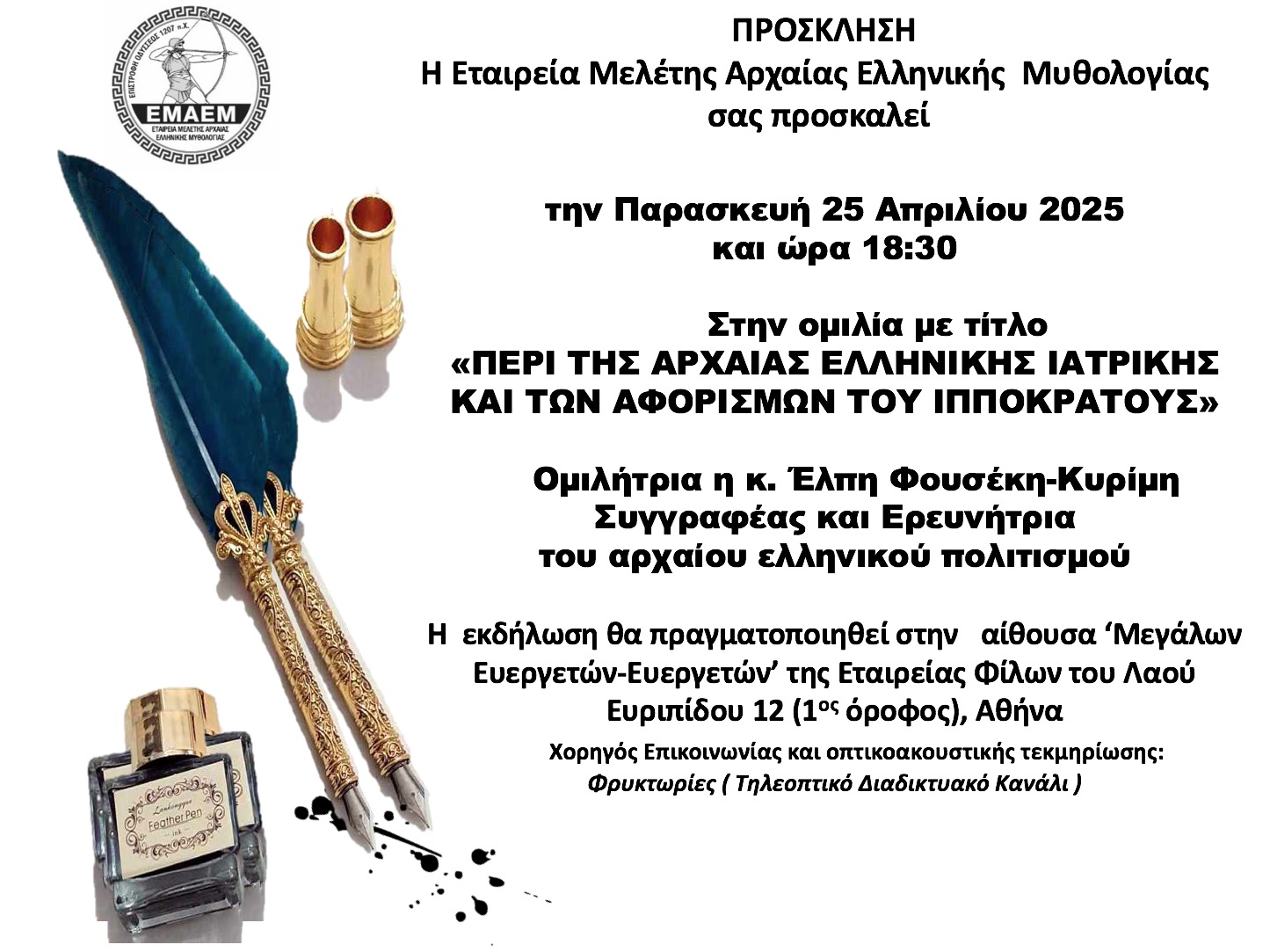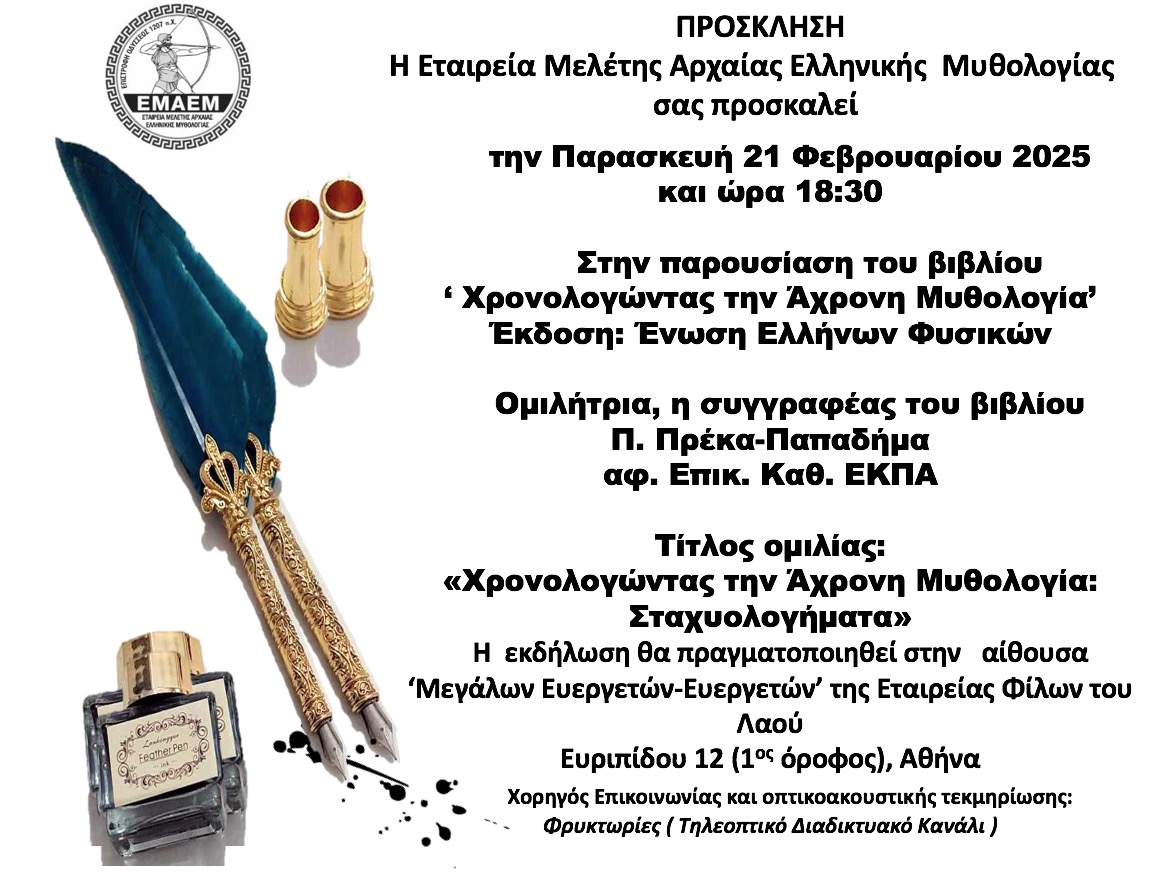Ομιλία και παρουσίαση βιβλίου
Στα πλαίσια των διαλέξεων της ΕΜΑΕΜ, θα παρουσιαστεί το βιβλίο με τίτλο: «Χρονολογώντας την Άχρονη Μυθολογία» της Π. Πρέκα-Παπαδήμα.
Μέλος του Σώματος Ομότιμων Καθηγητών ΕΚΠΑ Γραμματέας ΕΜΑΕΜ
Παρασκευή 21 Φεβρουαρίου 2025, 6:30-8:30 μμ
Εταιρεία Φίλων του Λαού (Αίθουσα ‘Μεγάλων Ευεργετών-Ευεργετών’),
Ευριπίδου 12 (1ος όροφος), Αθήνα.
Για το βιβλίο θα ομιλήσουν:
Καθηγητής Στ. Παπαμαρινόπουλος, Πρόεδρος ΕΜΑΕΜ
Καθηγητής Ευστ. Θεοδοσίου, Πρόεδρος Ένωσης Ελλήνων Φυσικών
Ηλίας Μαριολάκος, Ομότιμος Καθηγητής ΕΚΠΑ
Ξενοφών Μουσάς αφ. Καθηγητής Φυσικής Διαστήματος ΕΚΠΑ
Η Συγγραφέας θα ομιλήσει με θέμα:
«Χρονολογώντας την Άχρονη Μυθολογία: Σταχυολογήματα»
ΠΡΟΓΡΑΜΜΑ ΕΚΔΗΛΩΣΗΣ
18:30-18:45 Χαιρετισμοί
18:45-18:55 Καθ. Ευστ. Θεοδοσίου
18:55-19:15 Καθ. Στ. Παπαμαρινόπουλος
19:15-19:25 Ομ. Καθ. Η. Μαριολάκος
19:25-19:35 αφ. Καθ. Ξ. Μουσάς
19:35-20:15 αφ. Επικ. Καθ. Π. Πρέκα
20:15-20:30 Συζήτηση
Abstract
Η ελληνική μυθολογία καλύπτει το σύνολο των μύθων που σχετίζονται με την αρχαία ελληνική παράδοση, έτσι όπως αυτή διασώθηκε στα κείμενα της ελληνικής Γραμματείας (π.χ. τα Ομηρικά έπη, τα έργα του Ησιόδου, τις διηγήσεις του Ηρόδοτου, του Διόδωρου Σικελιώτη, του Παυσανία, του Στράβωνα κ.ά.) ή στις απεικονίσεις σκηνών, στην αγγειοπλαστική των ιστορικών χρόνων. Η μυθολογία είναι προϊστορία και όχι ιστορία, καθότι λείπει η χρονολογία, «που είναι τα νεύρα της ιστορίας», όπως γράφει ο Σταγειρίτης, είναι συνεπώς άχρονη. Τα περισσότερα από τα διασωθέντα έργα των τριών μεγάλων τραγικών ποιητών μας, Αισχύλου, Σοφοκλή και Ευριπίδη, έχουν θεματολογία της Μυκηναϊκής περιόδου και καλύπτουν θέματα εντασσόμενα στην ελληνική μυθολογία (Επικός ή Θηβαϊκός κύκλος). Εντόπισα όμως μια χρονική σύνδεση μεταξύ της θεματολογίας των διασωθέντων τραγωδιών και του Τρωικού πολέμου. Αλλά η διεπιστημονική ερευνητική ομάδα μας έχει χρονολογήσει τόσο την άφιξη του Οδυσσέα στην Ιθάκη (1207 π.Χ.), όσο και την άλωση της Τροίας (1218 π.Χ.), σε αντίστοιχες δημοσιεύσεις σε διεθνές επιστημονικό περιοδικό, με βάση τα αστρονομικά στοιχεία των Ομηρικών επών. Έχοντας ως αφετηρία αυτές τις χρονολογήσεις, στο παρόν βιβλίο, χρονολόγησα και τα συμβάντα που περιγράφονται στα έργα των τριών τραγικών ποιητών. Και με αυτά ως αρχή, έκανα μια «χρονολογική επέκταση» και σε άλλες μυθολογικές περιγραφές που συνδέονται με αυτά τα συμβάντα. Κατ’ αυτόν τον τρόπο η άχρονη μυθολογία χρονολογήθηκε. Τα γεγονότα και η παρουσία των διαφόρων σημαντικών προσώπων, που περιλαμβάνονται στις τραγωδίες του Επικού και του Θηβαϊκού κύκλου, αλλά και στις χρονικές και μυθολογικά συσχετιζόμενες επεκτάσεις αυτών των γεγονότων, δένονται αρμονικά με τον χρόνο, σε μια συνεχόμενη αλυσίδα χωρίς καμία ασυμφωνία ή υπέρβαση.
CURRICULUM VITAE
Preka-Papadema Panagiota
Αφ. Επίκουρος Καθηγήτρια Αστροφυσικής Παν/μιου Αθηνών
Member of the Association of Professors Emerity of the University of Athens
ppreka@phys.uoa.gr
Εκλεγμένη Γραμματέας του Δ.Σ. της ΕΜΑΕΜ (Εταιρεία Μελέτης Αρχαίας Ελληνικής Μυθολογίας), από άνοιξη του 2023 [ΕΚΛΟΓΕΣ 13/2/2023]
Assistant Professor in Section of Astrophysics, Astronomy and Mechanism, Faculty of Physics, University of Athens, Greece. Until 31.8.2020.
Main Topics of Research Activity:
- Solar Physics: a) Radio emission from solar active regions and solar eruptions b) Study of solar activity spatial and temporal variations during the 11years solar cycle. c) Solar-terrestrial phenomena relations.
- Effect of helio-geomagnetic activity on human physiology.
- Planets: Magnetospheres, atmospheres, morphology etc. Geomagnetic Activity.
- Archaeoastronomy.
Educational Work
Διδασκαλία επί σειρά ετών των μαθημάτων: Εισαγωγή στην Αστροφυσική (Τμήμα Φυσικής, προπτυχιακό πρόγραμμα σπουδών), Ηλιακή Φυσική (Τμήμα Φυσικής, προπτυχιακό και μεταπτυχιακό πρόγραμμα σπουδών), Φυσική Διαστήματος (Τμήμα Φυσικής, προπτυχιακό και μεταπτυχιακό πρόγραμμα σπουδών), Αστρονομία Β (Τμήμα Μαθηματικών, προπτυχιακό πρόγραμμα σπουδών).
Teaching the laboratory exercises:
Φυσική I και II (Τμήμα Φυσικής), Αστροφυσική (Τμήμα Φυσικής), Αστρονομία (Τμήμα Μαθηματικών).
Εποπτεία Ειδικών θεμάτων φοιτητών: 107
Κύριος επιβλέπων ΜΔΕ (Μεταπτυχιακό Δίπλωμα Ειδίκευσης): 10
Member of three-member commission of Master's Degrees: 34
Member of the doctoral theses monitoring committee: 23
Member of a seven-member doctoral theses review committee: 12
Research Work
Publications (International and Greek Magazines and Proceedings of Conferences): 148
Συγγραφή βιβλίων:
‘Στα μονοπάτια του Ήλιου: Εισαγωγή στην Ηλιακή Φυσική’. Πρέκα-Παπαδήμα Π., Δανέζης Μ., Θεοδοσίου Σ., Καργιολάκη Δάφνη, Αθήνα 2009, Εκδοτικός Οίκος Δίαυλος.
‘Χρονολογώντας την Άχρονη Μυθολογία’, Πρέκα-Παπαδήμα Παν., Έκδοση Ένωση Ελλήνων Φυσικών, Αθήνα, 2024.
Συμμετοχή σε Συνέδρια με Ανακοινώσεις: 116 και Μέλος Οργανωτικής Επιτροπής Συνεδρίου: 14
Κριτής Εργασιών σε Διεθνή Επιστημονικά Περιοδικά και Topic Editor στο Επιστ. Περιοδικό ‘ATMOSPHERE’. Guest editor of Special Issue: The Effect of Helio-Geomagnetic Activity in the Geo-Environment and by Extension to Human Health
https://www.mdpi.com/journal/atmosphere/special_issues/solar_activity
Επιστημονικός Υπεύθυνος Ερευνητικού Προγράμματος σε σχέση με τον Ηλιακό ραδιοφασματογράφο ARTEMIS/J-L. Steinberg (ARTEMIS-IV/JLS).
Interviews, lectures, popular articles, teaching in Summer Schools for students, etc









